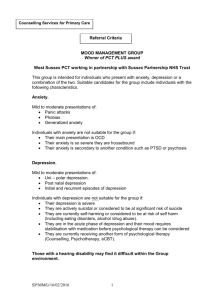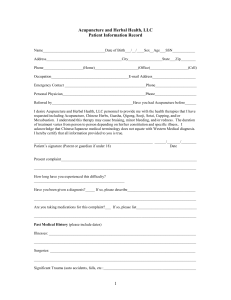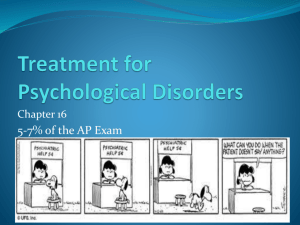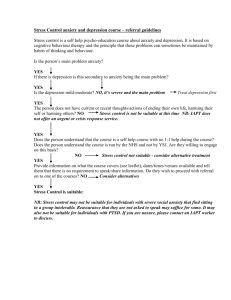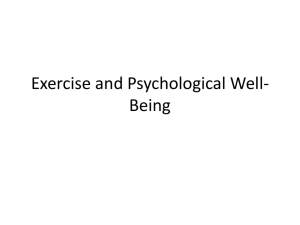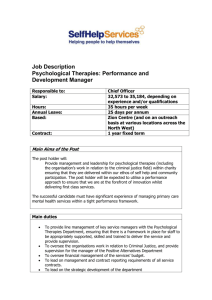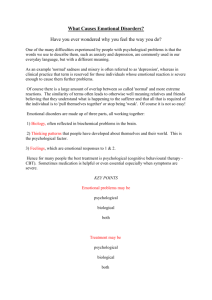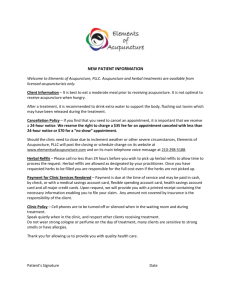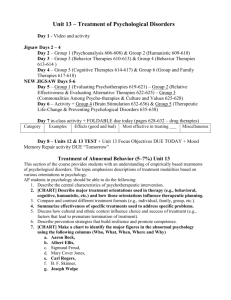Second chance for alternative medicines
advertisement
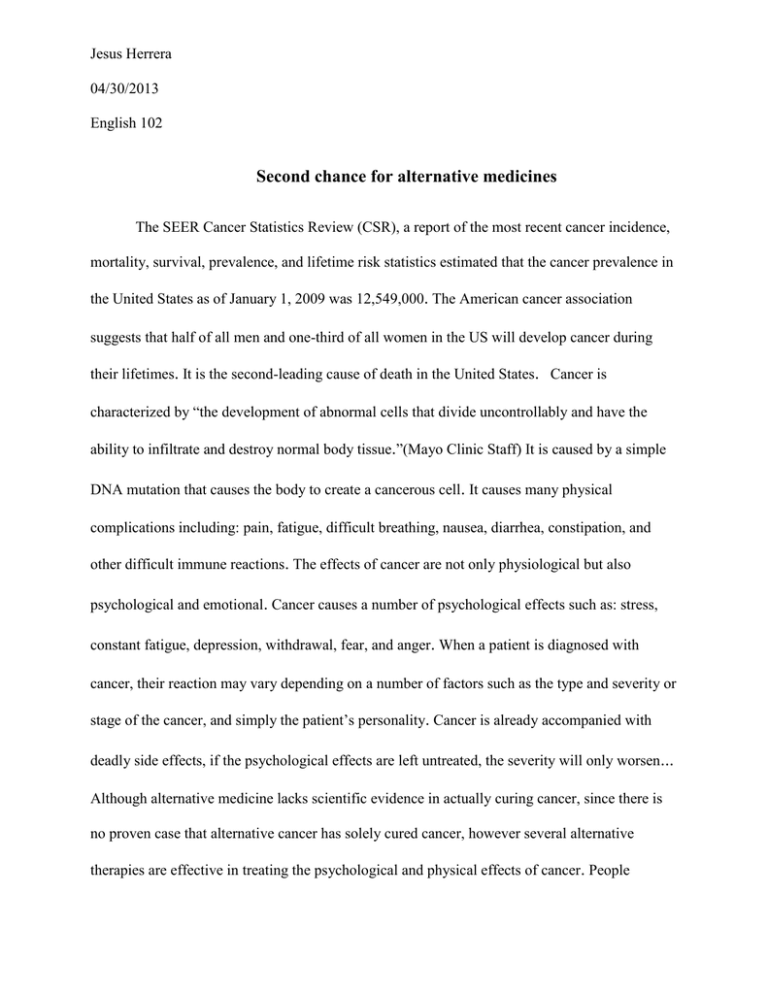
Jesus Herrera 04/30/2013 English 102 Second chance for alternative medicines The SEER Cancer Statistics Review (CSR), a report of the most recent cancer incidence, mortality, survival, prevalence, and lifetime risk statistics estimated that the cancer prevalence in the United States as of January 1, 2009 was 12,549,000. The American cancer association suggests that half of all men and one-third of all women in the US will develop cancer during their lifetimes. It is the second-leading cause of death in the United States. Cancer is characterized by “the development of abnormal cells that divide uncontrollably and have the ability to infiltrate and destroy normal body tissue.”(Mayo Clinic Staff) It is caused by a simple DNA mutation that causes the body to create a cancerous cell. It causes many physical complications including: pain, fatigue, difficult breathing, nausea, diarrhea, constipation, and other difficult immune reactions. The effects of cancer are not only physiological but also psychological and emotional. Cancer causes a number of psychological effects such as: stress, constant fatigue, depression, withdrawal, fear, and anger. When a patient is diagnosed with cancer, their reaction may vary depending on a number of factors such as the type and severity or stage of the cancer, and simply the patient’s personality. Cancer is already accompanied with deadly side effects, if the psychological effects are left untreated, the severity will only worsen... Although alternative medicine lacks scientific evidence in actually curing cancer, since there is no proven case that alternative cancer has solely cured cancer, however several alternative therapies are effective in treating the psychological and physical effects of cancer. People Jesus Herrera 04/30/2013 English 102 surveyed in this study done by Australian psychologist reported that when alternative medicine is used alongside with the traditional oncology therapies help them feel better and cope with having cancer and treatment. Many complementary therapies concentrate on boosting relaxation and reducing stress. They help to calm emotions, relieve anxiety, and increase your general sense of health and well being. All boosting the psychological well-being of a person. Alternative medicine should be incorporated in the current medical plan to treat the psychological effects of cancer Cancer is usually treated through chemotherapy or radiation. This is used instead of or in conjunction with surgery. Radiation is the use of high-energy x-rays or other radiations to kill cancer cells or keep them from growing. There are two ways to administer radiation. External radiation is the use of a machine to administer radiation from outside the body. Internal radiation is the administration of radioactive chemicals sealed in needles or wires that are inserted directly into or near the cancer. How radiation is administered is based on where the cancer is and what stage it is in. Radiation therapy does have side effects dependent on where the radiation is targeting. Side effects can show up months or years after treatment has ended. (“Radiation Therapy side effects,” 2010) Side effects from radiation oncology can range from altered mood and sleep problems to memory loss. Cancer Treatment Centers of America warns that the patient could become emotionally unstable, have outbursts and seem confused. Chemotherapy is one of the other and more common forms of curing cancer. Like radiation, it is the use of drugs to stop Jesus Herrera 04/30/2013 English 102 the growth of cancer by killing the cells or stopping them from dividing. One form of chemotherapy can be administered in pill form or in injection into a vein or muscle. The drugs enter the blood stream and move toward the cancer cells. The other way chemotherapy can be administered is direct injection into the spinal fluid, organ, or body cavity affected. A combination treatment is use of more than one type of drug to fight cancer. Chemotherapy and radiation, like all other treatments, has several side effects. The patient will most likely need complementary medications to treat the side effects. Some of the side effects are anemia, bleeding, and bruising. A patient may have constipation or diarrhea. Fatigue is a typical side effect. Hair loss used to be common, but with clinical trials it is not always the case. Nausea and vomiting can be common, as well as dry mouth, sensitivity to heat and cold, and changes in taste and smell. A patient may experience pain, numbness, tingling, burning, weakness in the limbs, and it may progress to other parts of the body. The “proven" methods of treating cancer—chemotherapy, radiation, and surgery are invasive and have several devastating side effects, and treats only symptoms. The treatment within itself can cause some psychological disorders such as depression and anxiety but it can also affect memory and concentration. Researchers now believe that from about 40–80% of individuals undergoing chemotherapy experience a phenomenon they call chemobrain(John Hopkins Medicine).Chemobrain is real and is related to structural changes in the brain caused by Jesus Herrera 04/30/2013 English 102 chemotherapy drugs. Although most research to date has been conducted on women with breast cancer, this phenomenon does not appear to be unique to any single type of cancer. Chemotherapy not only have psychological effects but it also cause physical changes to the brain. A recent study that looked at images of the brains of women who had chemotherapy found striking physical changes after treatment. Researchers at Harvard compared MRI scans of the brains of 51 women who had undergone chemotherapy for breast cancer with those from women who had surgery only. One year after treatment, areas of the brain that are crucial for memory and problem solving were significantly smaller in the chemotherapy group. In addition, the greater the reduction in brain size, the worse the women performed on tests of memory and concentration. The treatment within itself causes psychological side effects. Cancer patients may suffer from anxiety or depression as a result of their diagnoses and treatment. Some patients may feel hopeless after a cancer diagnoses. They may suffer effects of anxiety when thinking about the uncertainty of their future or the side effects of their treatments. Women with breast cancer may lose their breasts to the disease causing them to become depressed and have issues with negative self image. A breakdown in the immune system because of these stressors could result in worsening or return of the cancer. Psychologists realize that it is very important to deal with these psychological issues. The emotional challenges can relate to the shock of a cancer diagnosis and fears about the future. More specific emotional concerns can Jesus Herrera 04/30/2013 English 102 range from apprehension about body image after treatment to periods of anxiety or depression, sadness, shock, horror, disbelief, frustration, distress, unhappiness, upset, worry, shame, fear. For instance, recent studies ( Bränström, Richard and Kvillemo 5) prove the fact that nurses need special training in order to be able to assist parents and their children to minimize possible negative psychological effects of cancer. All members of the family are affected when a loved one is diagnosed with cancer that is why more research should be done on treating the psychological effects of cancer. Thus, it is possible to conclude that cancer produces a profound impact on the life of the patient and the patient’s family, affecting its social, financial position and psychological states limiting the activity and changing the lifestyle of the entire family. The study reports the 6-month follow-up effects of a mindfulness stress reduction training program among patients treated for cancer on perceived stress, depression, anxiety, post-traumatic stress symptoms, positive states of mind, coping self-efficacy, and mindfulness. Psychotherapy, which is considered a category of alternative medicine in general. This study draws to attention the benefits of stress reduction training People of various cultures have relied on what alternative medicine. The term alternative medicine is a broad term and it covers several philosophies, approaches, and therapies. It generally describes those treatments and health care practices that are outside mainstream health care. Some subcategories of alternative medicine include” herbal therapy, special diets, psychotherapy, body-mind therapy, spiritual therapy, and other supplements that are not part of Jesus Herrera 04/30/2013 English 102 official practice. People use these treatments and therapies in a variety of ways. Alternative therapies used alone are often referred to as alternative, when used in combination with other alternative therapies, or in addition to conventional treatments they are referred to as complementary. However, there are alternative therapies such as reiki, called vibrational medicine which have not been proven and are not evidence based. Twenty years ago, acupuncture, and many other therapies were considered outright. Now, however, in clinics and hospitals around the country, non-traditional therapies are gaining wider acceptance as more studies are being done to prove their effectiveness In November 2012 (Igor Djan 2), a study was done; the purpose of the study was to determine the frequency of the use of alternative medicine among gastrointestinal cancer patients. A survey was completed by 193 patients at a cancer institute. A total of 48 (24.9%) patients did not use any type of alternative therapy; 145 (75.1%) patients used at least one product and 124 (64.25%) patients used herbal preparations and 145 (75.1% ) used alternative medicine to increase the chances for cure(Source 1). Based on this sample, the use of alternative medicine is significant among cancer patients. The number of people availing themselves of these alternative therapies is staggering. Patients appear increasingly willing to discuss the use of these remedies, especially when asked by their doctors. In order to encourage open communication of CAM use by their patients, doctors should be knowledgeable about the most commonly used remedies, or at least be able to direct patients to reliable sources of information. Jesus Herrera 04/30/2013 English 102 Patients should be aware of the many unproven alternatives. On the other hand, complementary therapies help manage pain, nausea, fatigue, anxiety, and other symptoms should be integrated into the patient’s overall care. Complementary therapies improve patients’ qualities of life and patient satisfaction Many people argue whether or not these alternative treatments are effective. The official position of the American Medical Association (A.M.A.)- is that a patient's improvement or recovery after alternative treatment might just as well be supplementary to the action taken. Some alternative treatments, such as acupuncture and herbal medicine and yoga which have impressive histories dating back thousands of years. As Dr Bridge stated: I had one patient with depression who really didn't want to take any antidepressants. I suggested that they tried taking St John's Wort as I heard this could work for depression, and there is some evidence for it. People who are skeptical or against alternative medicine claim that it isn’t as effective as conventional one (chemo and radiation) but the purpose of incorporating these alternative treatments is not to treat the cancer, it’s the treat the psychological effects cause by cancer. They believe that alternative medicine cannot offer the same solutions as the conventional one. Others think that people who cannot find a solution for a specific problem or illness they are prone to try alternative therapy instead of a conventional one. Some people think that alternative medicine is healthier because it relies on natural substances. One famous supporter of alternative medicine is Apple’s co-founder Steve Jobs. Which medicine is the one that works? Conventional or Jesus Herrera 04/30/2013 English 102 Alternative or both? The better question to ask is which one has worse side effects? Jobs was standing in front of an audience weeks/months before he passed away, imagine him doing that while on official meds – chemo, radiation and surgery. Some forms of alternative medicine that are used to treat psychological effects of cancer such as anxiety and depression. As already mentioned, some cancer patients might suffer from anxiety when they find out they have the disease. An alternative medicine that is just as effective as benzodiazepines (the current medication used to treat anxiety) is acupuncture. In “The Role of Acupuncture in Cancer Supportive Care”, a study done by Dr. Jaung-Geng Lin and Yi-Hung Chen states that “Acupuncture may also cause sedative and hypnotic effects in cancer patients for treating nervousness and insomnia.” Both of these are possible psychological effects caused not only by cancer but by several other terminal illnesses. Acupuncture is proven to be effective as a treatment for these side effects, but it still is not part of treatment plan. Many people argue that acupuncture is just as effective as a placebo, or that many components of acupuncture such as “chi spots” do not even exist. The outstanding number of studies done to prove the usefulness of acupuncture outweighs people who oppose acupuncture. Acupuncture has been an effective form of medicine for centuries, and is still a thriving practice in not only the Eastern world but the Western world as well. More and more common acupuncture is used in Western medicine practices. Jesus Herrera 04/30/2013 English 102 Another psychological effect often developed by cancer patients is depression. According to the Diagnostic and Statistical Manual of Mental Disorders, depression is defined as having the following symptoms. Clinical depression symptoms may include: significant weight loss or gain, fatigue, feelings of worthlessness or inappropriate guilt and recurring thoughts of death or suicide. To meet the criteria for clinical depression must have five or more of the above symptoms over a two-week period. A person can easily develop depression when diagnosed with cancer, the loss of hair due to chemo and radiation cause a negative self image; affecting one’s self esteem, the long hours of treatment can cause fatigue. Depression, a psychological effect of cancer is said to also be treated via complementary and alternative medicine. A example is yoga. Yoga is an ancient system of relaxation, exercise, and healing with origins in Indian philosophy. Physical and Psychosocial benefits of Yoga in Cancer Patients and Survivors, a study done by Dr. Maj Chinapaw states that ““yoga has strong beneficial effects on distress, anxiety and depression, moderate effects on fatigue, emotional function and social function and small effects on functional well-being” Researchers have consistently demonstrated that a minimum of 30 minutes of physical exercise for 5 days a week after a cancer diagnosis has been beneficial Yoga is beneficial and almost suitable for all cancer patients as it helps boosts the energy levels, increase in stamina and immune systems. Yoga helping treat these psychological side effects results in an increase in self-esteem, improvement in symptoms of depression and anxiety, and overall greater satisfaction with life. However, vigorous exercise or overdoing the exercise can Jesus Herrera 04/30/2013 English 102 worsen the disease as increase of blood flow can also increase the chance of the cancer cells spreading faster. So it is crucial that exercise is not done over the top. Extreme stress is always an effect on a patient, their family, and their friends due to the many complications outside of the patient’s physical complications. This includes job concerns, financial instability, and what will happen to the family if the patient passes away. Stress can negatively affect the immune system. Stress can be treated by medicine or alternative medicine. The alternative medicine way however is more efficient because it claims to provide the same treatment with no cost. One alternative treatment used to treat stress are herbal medicines . In "Chinese Herbal Medicines As Adjuvant Treatment During Chemo or Radio-Therapy For Cancer”, a stud done by Dr. Tang Wei states that “in cancer treatment Chinese herbal medicines in combination with chemo- or radio-therapy can be used to enhance the effectiveness of and diminish the side effects and complications caused by chemo- and radio-therapy” Chinese Herbal Medicine has been used for thousands of years. A country cannot achieve a population of over a billion if your system of medicine doesn't work. Our health care system is based on drugs and surgery, so alternative medicine is rarely prescribed. On average Chinese do not live as long as Americans ,but they do suffer less diabetes and heart disease. Therefore, an understanding of Chinese herbal medicines is needed by physicians and other health care providers. Many Americans flock to alternative practices either because their suffering has not been alleviated by standard medical or surgical treatment, or because the traditional treatments Jesus Herrera 04/30/2013 English 102 themselves are too expensive or dangerous. Too many doctors are thought to be casually professional and emotionally distant, inclined to cure a specific disorder narrow-mindedly without comforting or caring for the patient. Acupuncture, yoga and herbal medicines should be used in place of current medications that treat depression, stress and anxiety. Several studies have shown that alternative medicines are just as effective in treating the psychological effects.
